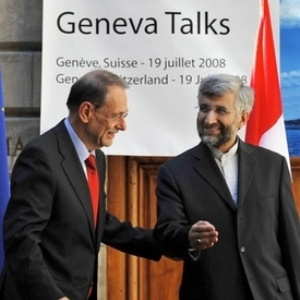Why are we overjoyed?

The significant developments of Iran-U.S. ties within the recent days have made it necessary for us to undertake a wisely revision of global developments and the changing international system. Through a conceptual assessment we must show the appropriate reaction to current events.
In fact, a tangible change has taken place in the foundations of the international system both in terms of soft and hard aspect. The soft aspect of global system lacks a coherent intellectual paradigm nowadays. World powers use the strategic rhetoric for unstrategic content; particularly visible in neo-cons’ statements.
We should know that United States is not following a new line, but imposing its tactical behavior to politics in order to assess the opponents. The current behavior of U.S. administration concerning Iran fulfills not a minimum of their demands; rather, they are promoting a kind of Iranophobia in the region. Iran is considered as the number one enemy of the region, and solving the problems in Middle East is the prelude to resolving global problems and introducing a new paradigm. United States is trying to create an axis around which the global system will revolve; and Iran is considered as a substance of experiment for the new global paradigm.
Why is the United States seeking a new global paradigm? It seems that centers of power in United States today assume that U.S. security is equal to global security. Neo-cons’ United States is different from Democrats and Liberals’ United States; and they view United States’ hegemony differently.
That’s why we must know that United States’ general policy towards Iran; i.e. containment hasn’t changed. What they are looking for is selective, limited interaction with Iran besides containment. An important question comes to mind if we accept that no change has occurred: why has America accepted to attend the nuclear negotiations?
The reasons can be:
- a bureaucratic turn and the fact that neo-cons are under pressure;
- engaging Iran in further talks over problems;
- Persuading the world that pressures and sanctions have been effective.
With these assumptions, we can’t say that Iran-U.S. ties are undergoing a progress. The truth is that neo-cons have always viewed Iran ideologically, but the U.S. administration is in need of the support by the public opinion in America and the world.
It is worth to remind Burns’ opening statement before the House Foreign Affairs Committee, where he elaborated on U.S. policy towards Iran. In his statement Burns criticized Iran’s role in Lebanon, Afghanistan, Palestine and Iraq, its record on human rights and what he called Iran’s ’nuclear ambition’. Burns believes that UN sanctions against Iran have been effective and pressures should continue.
From his statements we can find out that opening an interests section in Iran is merely a part of United States’ psychological warfare. This demand has been always repeated during the past thirty years by both Democrats and Republicans, as the archives of Iran’s Foreign Ministry can testify. We must be watchful about this warfare.
I believe that resolving the crisis between Iran and the United States must be based on our three principles in foreign relations; i.e. dignity, wisdom and expedience. Every proposal from the other side must be studied carefully rather than being responded hastily and superficially. Exaggerating about the participation of U.S. representative in negotiations or opening of the interests section is sheer overjoying. What we need is an intelligent diplomatic moves, especially when it comes to the United States.
Change of structures in the international system is a reality. We must redefine our views on the role of United States, other international actors and the concept of power itself. Avoiding assessment of the new international tide will put us in a plight. Iran needs a coherent discourse that considers all strategic issues.

